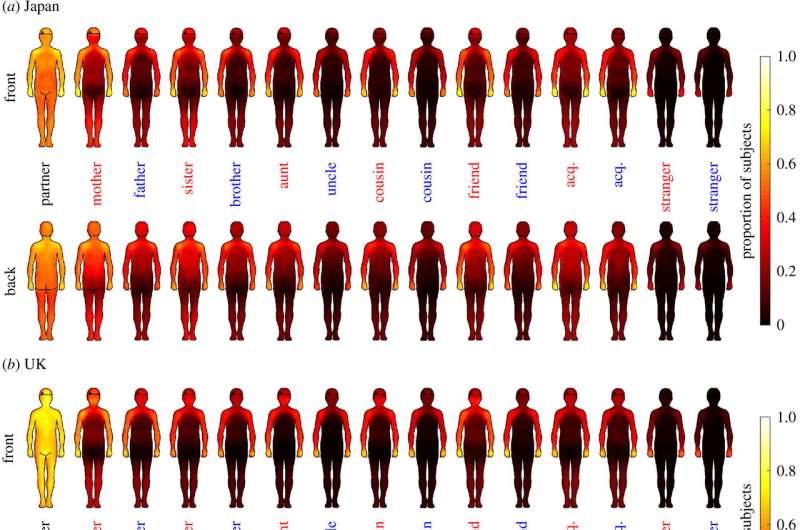April 24, 2019 report
Study shows British and Japanese people have very similar touching rules

A team of researchers with members from Finland, Japan, the U.K., Germany and Singapore has found that people from the U.K. have similar touching rules as people who live in Japan. In their paper published in Proceedings of the Royal Society B, the group describes their study that involved querying several hundred people from the U.K. and Japan regarding touching and what they found.
Most everyone is aware of their own boundaries regarding touching. We like to be touched by people we know and love but cringe if touched inappropriately by a stranger. We also know that we have our own personal rules about who can touch us where and when. But what is not clear is the role that reinforcement of social structure by touching plays in our daily lives. People shake hands as a form of greeting, for example, and in some situations actually hug one another—even strangers. In this new effort, the researchers sought to learn more about how social touch is involved in social network maintenance and reinforcement. To find out, they asked 386 people from the U.K. and 255 people from Japan to sit in front of a computer to answer questions about where it was permissible for people in their lives to touch them and under what circumstances.
Not surprisingly, the researchers found that people from both cultures do not like to be touched by people they do not know—most reported that the only acceptable means of doing so was via handshake when meeting someone new. People of both cultures also reported being uncomfortable with seemingly innocuous touching, such as on the arm. On the other end of the spectrum, people from both cultures reported that they were comfortable with romantic partners touching them anyplace on their body. For those people who were neither strangers nor romantic partners, people from both cultures reported feeling more comfortable with touching the closer the bond was with a given individual. Also, the researchers reported that people from both cultures were more comfortable being touched by somebody female, than somebody male, in general. The one difference they found between the two cultures was British people reported feeling more pleasure at being touched socially than did the people from Japan.
More information: Juulia T. Suvilehto et al. Cross-cultural similarity in relationship-specific social touching, Proceedings of the Royal Society B: Biological Sciences (2019). DOI: 10.1098/rspb.2019.0467
Journal information: Proceedings of the Royal Society B
© 2019 Science X Network



















